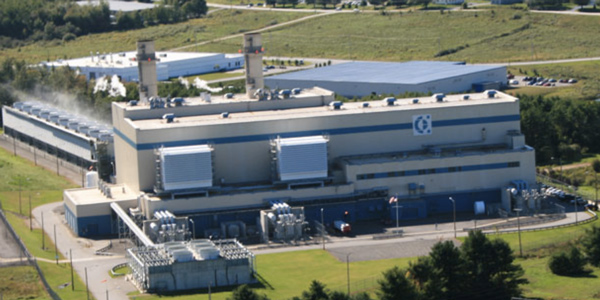By Michael Kuser
Three top generators in Maine have asked the state’s Public Utilities Commission to allow them to intervene late as full parties in the proceeding on New England Clean Energy Connect (NECEC), the 1,200-MW HVDC transmission line proposed by Central Maine Power (CMP) and Hydro-Quebec.
The 145-mile project before the PUC (2017-00232) would deliver Canadian hydropower from Quebec to Lewiston, Maine, at an estimated cost of $950 million. CMP is a subsidiary of Avangrid.
Massachusetts last month selected NECEC as the alternative for the state’s 9.45-TWh clean energy solicitation after the New Hampshire Site Evaluation Committee (SEC) unanimously rejected Eversource Energy and Hydro-Quebec’s Northern Pass, the 1,090-MW transmission project that the Bay State had awarded the contract just a week earlier. (See Mass. Picks Avangrid Project as Northern Pass Backup.)
Survival Mode
Generators Calpine, Dynegy and Bucksport Generation, owners of one-third of the installed electric generating capacity in Maine, told the PUC that awarding a certificate of public convenience and necessity to NECEC would threaten their plants’ economic survival and harm the region’s competitive wholesale power market.
The PUC plans to issue a decision on the proposal by September, a year after CMP filed, which is standard procedure. Maine Gov. Paul LePage and his Energy Office both wrote letters to the PUC urging it to review CMP’s petition in an “expeditious manner” and not delay or suspend the proceeding.
CMP on March 23 responded and said they did not object to the late‐filed intervention — if the PUC prohibits the intervenors from reopening phases of the case that have already closed.
The generators “seek to entirely reset the clock in this matter and introduce intervenor testimony in utter disregard of the fact that the commission and the parties are six months into a 12-month case schedule, the period for intervenor discovery on CMP’s initial petition has closed, and the deadline for intervenor testimony has passed, not once, but two times,” CMP said.
The generators argued that the developer presented reduced wholesale energy and capacity prices in the region and in Maine as the primary benefit of the project and made no case for reliability benefits.
However, CMP did just that in its September 2017 filing: “In addition to the electricity price suppression, [greenhouse gas] reductions and employment and economic development benefits discussed above, the NECEC transmission project will provide Maine resource adequacy and transmission system reliability benefits at no cost to Maine customers.”
CMP argued in its initial filing that “transmission upgrades to permit an additional 1,200 MW of generation to interconnect” ensures that NECEC’s power “will be deliverable to the New England Control Area. The addition of this non-natural gas-fired capacity (and related energy) will help ensure that ISO-NE has adequate generation resources available to meet load and reserve requirements throughout the year, including especially during periods when natural gas supplies are constrained.”
The intervening generators said “it is abundantly clear that the integration of large-scale, out-of-market (i.e., subsidized) resources within the current ISO-NE market may have profound unintended consequences, which is evidenced by the extensive and challenging stakeholder discussions during the [New England Power Pool’s Integrating Markets and Public Policy] debate and subsequent NEPOOL and FERC-related reviews of proposed capacity market reforms.” (See CASPR Filing Draws Stakeholder Support, Protests.)
Impeding Renewables
Massachusetts issued its MA 83D solicitation for hydro and Class I renewables (wind, solar or energy storage) last July. The selection committee for the clean energy request for proposals issued in July 2017 includes representatives from the state’s Department of Energy Resources and from distribution utilities Eversource, National Grid and Unitil.
Any contract awarded under the RFP must be negotiated by March 27 and submitted to the state’s Department of Public Utilities by April 25. The New Hampshire SEC voted March 12 to wait until its Northern Pass permit denial is published later this month before considering Eversource’s appeal of that decision, effectively killing the project’s chance to meet the Massachusetts deadline.
The New England generators told the Maine PUC that they “had good cause for delaying their intervention efforts” in that NECEC had been one of more than 40 bids competing to secure the Massachusetts contract and that “it would have been highly impractical for the [generators] to intervene in siting and/or certificate proceedings for every one.”
“At the time, it was widely believed that Eversource Energy, as a member of the state’s evaluation team, would favor its own affiliate’s project, Northern Pass Transmission in New Hampshire, as subsequently proved to be the case,” they said.
The generators also questioned the claim that NECEC will lead to lower prices.
“It is abundantly clear that [NECEC] has been proposed solely to meet a Massachusetts policy goal; it has nothing to do with meeting the needs of Maine ratepayers, and the primary long-term benefits of the project will accrue to Hydro-Quebec and CMP shareholders,” they said.
The generators further argued that, should the project go forward, “it will impede the development of alternative renewable energy projects in Maine, such as solar and onshore and offshore wind farms, for the foreseeable future. This result would be contrary to Maine’s statutory policy favoring the use of ‘renewable, efficient and indigenous resources.’”
The Conservation Law Foundation filed comments asking the PUC to wait until the Massachusetts RFP has been decided before considering the NECEC proposal.
The CLF argued that presumption of the project’s selection in the state RFP underlies CMP’s cost analysis. It also said CMP’s “calculations of benefits including greenhouse gas emission reductions, improvements in system reliability, reductions in electricity prices, and employment benefits … are premised on a baseline scenario in which there is no other project selected in the Mass. RFP.”






